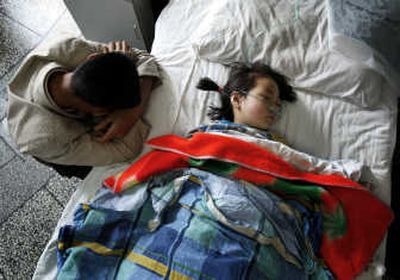China quake toll expected to hit 50,000

HANWANG, China – The Chinese government said Thursday that the number of people killed by this week’s earthquake in Sichuan province was likely to more than double to 50,000 as rescuers dug out more victims – some still alive, but many more dead.
With the official death toll climbing to 19,509, China dropped its insistence on delivering rescue and medical assistance on its own.
An elite team of Japanese rescue workers was due to arrive in the provincial capital of Chengdu late Thursday. They would be the first foreign aid workers invited to the earthquake scene, although China has been accepting international donations of money and supplies. A Taiwanese team was also expected shortly, and officials said Russian, South Korean and Singaporean teams would join soon.
The People’s Liberation Army ordered one of its largest peacetime deployments of troops. More than 130,000 soldiers were reported to have reached the disaster scene, with thousands more on their way, according to the New China News Agency.
“We will never give up hope looking for survivors,” Gao Qiang, vice minister of health, said in a news conference.
The Chinese government estimated that 4 million homes were destroyed and 10 million people were either killed, injured or left homeless. Many residential areas in the valleys are now entombed in mud, the result of landslides triggered by the tremor.
Gu Qinghui of the International Federation of the Red Cross said most of the residents of Beichuan County, once home to 13,000 people, were now feared dead.
“This whole county has been destroyed; basically there is no Beichuan County anymore,” Gu told reporters visiting the region Thursday.
Government officials and citizens found themselves pressed to their limits in coping with the aftermath of the Monday earthquake, the worst in the country in more than three decades. The government issued an emergency request for everything from cranes and bulldozers to shovels and hammers.
The rescue effort has been herculean. On the railroads alone, 56 trainloads of soldiers have been sent out along with 157 railcars of ambulances and equipment. The main highway from Chengdu to Beichuan, about 40 miles from the epicenter, had convoys of ambulances and military trucks, some stretching a half-mile long. Tents, bottled water, medicine, blankets and jackets are pouring in.
But in some areas, with many roads, bridges and rail lines damaged by the earthquake, many of the rescue workers have had to travel on foot to reach victims. Chinese mountaineering clubs have been called to send trained climbers to reach the most remote areas.
In a now familiar pattern, rescue workers have unearthed dead victims, placed them in yellow body bags, or tarps or blankets and moved them to makeshift morgues in wheelbarrels and trucks. Families have struggled to identify their relatives’ bloated bodies by the clothes they were wearing. Tens of thousands of people remained missing or homeless.
Troops dug burial pits. They repaired roads and bridges at the heart of the tragedy, mountainous Wenchuan County, which was the epicenter of the magnitude 7.9 quake. Although earthquake victims have been known to survive for more than a week, their chances dim with each passing day. Paratroopers working out of the hardest-hit areas one day pulled out 13 survivors and 125 dead from the rubble, the government said.